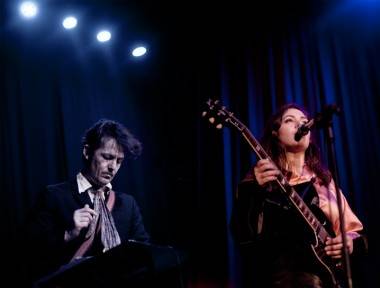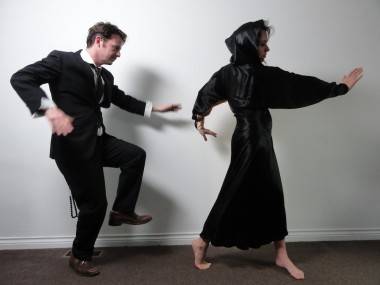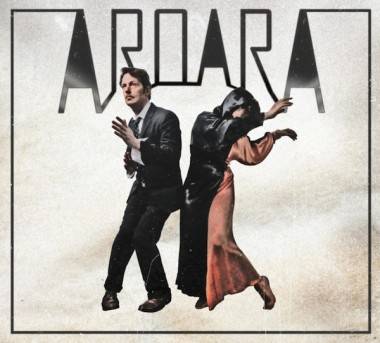Interview – AroarA
by Ria Nevada (@ria_nevada)
One of this weekend’s highlights is AroarA’s upcoming show at Electric Owl on Saturday night. The Montreal-based band is comprised of married couple Ariel Engle and Andrew Whiteman; the latter is celebrated as one of the founding members of Broken Social Scene and Apostle of Hustle. They developed this passion project after falling in love with the poetry of Alice Notley and used her vivid images as inspiration for their Gothic-Americana record.
I gave Andrew a call just as he was starting his day; in fact he was still in the middle of brushing his teeth. After gargling and rinsing, we leapt into a conversation about our shared appreciation for Martin Scorsese’s Taxi Driver, talked more about the mystical and eerie influences behind AroarA’s debut LP In the Pines, and the treasures that he often finds in garbage cans that just might end up in art gallery near you.
Ria Nevada: I absolutely lost my mind, in a good way of course, when I read your description for the inspiration behind “In the Pines” because it just so happens that Bernard Hermann’s score for Taxi Driver is actually one of my favourite compositions of all time. Do you have a favourite scene from the movie?
Andrew Whiteman: Oh right! Okay! Yeah I do actually – I have a number of favourite scenes, I don’t know if it’s going to make any sense. But one of my favourite scenes is when he’s taking Cybill Shepherd to, you know he thinks he’s taking her on a date, and what’s wrong with him taking her to a nice romantic movie and he’s actually taking her to a porn?
RN: Yeah! How could he do Betsy like that?! She’s a classy broad.
AW: Yeah exactly, she’s a classy broad. And anyway, he’s on the street and there’s that drummer, and he was an actual guy in New York. I saw him the first time I went there. He would play like swing drum routines on a snare drum, and he goes “And now, something by a little Chick Webb” and then he does this crazy swing drum thing. That’s one of my favourite scenes.
RN: Do you find that most of your inspiration comes from other art and media forms and not necessarily musical influences?
AW: Definitely.
RN: Anything specific come to mind right now?
AW: Oh well, you know, I guess my big thing is poetry. That’s what I love the most. I like the words, but the sound of a poet reading is big for me. That’s how I discovered Alice, by finding her reading poems online. And then also, I’m a big fan of, uh, just an art junkie, you know – anything like Robert Frank’s photographs or something else. I’m like a magpie or whatever – if I see something shiny on the ground I’ll pick it up, like garbage is a big thing too. I like picking things out of it.
RN: Have you found anything good recently?
AW: Recently… well, I don’t want to give it away, but maybe in a few years I’ll have my first art show and it’s based on things that people throw away. It’s a certain object that people throw away all the time, but I don’t want to say it because someone will steal my idea because it’s really good.
RN:Â You are actually here the weekend of the New Forms Festival which has brought out some fantastic multimedia artists. The new record paints some really strong images – what sort of scenes did you imagine when you were writing these songs?
AW: That’s an interesting question because Alice’s work – she’ll paint a really stark, really intense image, like the lyrics that we explore. I didn’t really think too much about that, but I guess in track # 11, I did feel that the poem number 11 is a bit of a respite? Like there’s a little break, and we start the song by saying “Marry again, marry again” and it comes through as like Gothic American dustbowl type imagery there. I really felt like I saw a picture of a small town, and the big event of a small town of people having a wedding or something. So when I programmed the drums, the drums I used to do that were like kind of old, I used the sound of an old marching band. Sometimes it would work that way.

AroarA opening for Martha Wainwright at the Rio Theatre, Vancouver, March 9 2013. Jess D. Lea photo for The Snipe News.
RN: The minimalist approach worked really well with this record – was this a clear vision from the get-go or did you ever think of making it a larger production to maybe dramatize the haunting themes in your music?
AW: No, no, never. Because Alice isn’t about that and that’s one of the reasons that we resonate with Alice, which is not about making a big scene like that or blowing dramatics with an orchestra for an arena, you know what I mean? The thing about Alice is she’s incredibly political and her politics are evident in all her works, but they’re very close to who she is as a person. She’s not a grandstander, and we’re not grandstanders. That’s one thing why I love Alice and why Ariel and I gravitate to her because, like Ariel would say, it’s very terrestrial, it’s like feet on the ground. So it’s not about Gilbert and Sullivan, you know what I mean?
RN: So this was a passion project for you and Ariel? It’s not something that would have ever found its place in Broken Social Scene or Apostle of Hustle?
AW: Yeah exactly, exactly. BSS is like too many cooks, and Apostle, that wasn’t what was really going on in terms of conceptualism. I mean, I didn’t even have this idea until Ariel and I were together so it just naturally manifested.
RN: Well we’re excited to catch you out here this weekend! Thanks Andrew!



